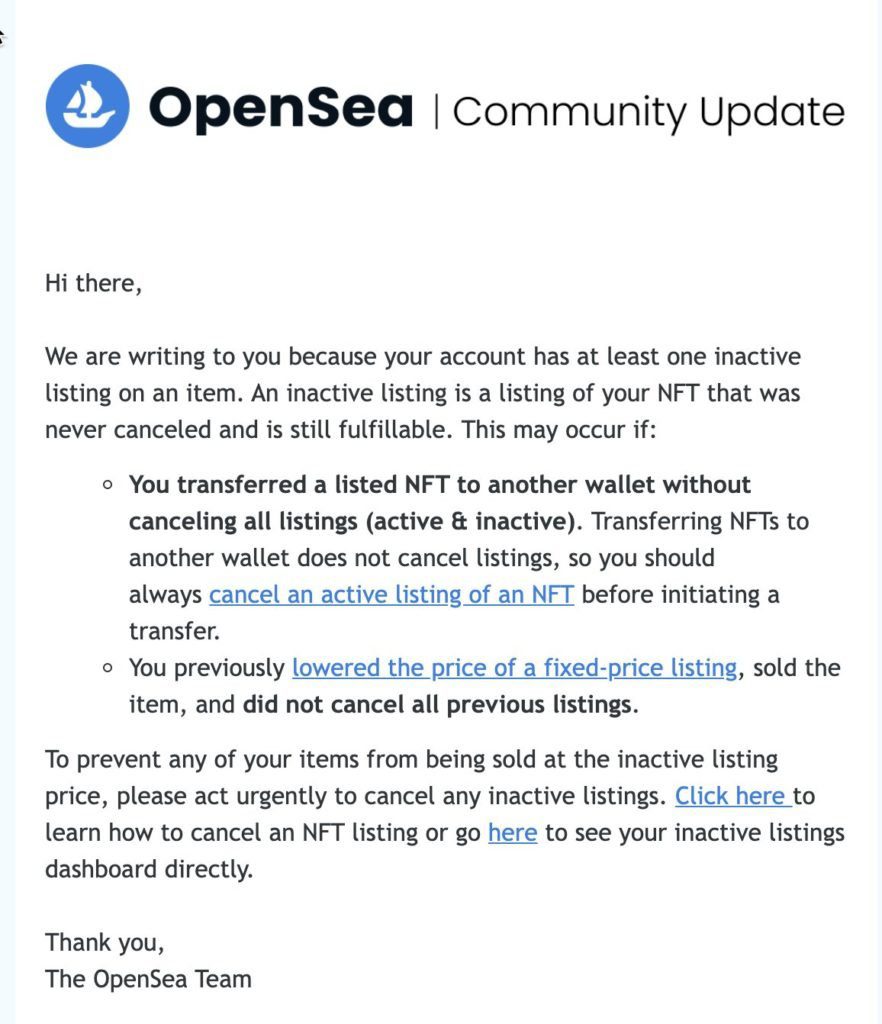Key Takeaways
- An email from OpenSea has resulted in several users losing high-value NFTs.
- The email urged users holding NFTs with inactive listings to cancel them without first transferring their NFT to a different wallet.
- Snipers were able to front-run cancelation transactions to grab NFTs for their previous listing prices.
Share this article
OpenSea has told users to urgently cancel inactive listings on their NFTs to prevent opportunists from buying them at a fraction of their value. Unfortunately, OpenSea’s advice was poorly thought out and has made it easier to snipe inactive listings by checking the Ethereum mempool for listing cancellations.
OpenSea Blunders Again
An email sent out to OpenSea users has had unintended consequences.
In an email sent out Thursday, NFT marketplace OpenSea told users with inactive NFT listings to cancel them to prevent opportunists from buying NFTs for previous listing prices. However, users following the advice in OpenSea’s email are inadvertently putting their NFTs at more risk.
The problem is this: If a user tries to cancel a listing without first moving the NFT to a different wallet, it makes it much easier for snipers to identify the undervalued listing. By sending a cancellation transaction to the Ethereum mempool, opportunists can identify potential victims and front-run the cancellation with their own transaction to buy the NFT at the previous listing price. As OpenSea didn’t tell users to first move the affected NFTs out of the wallet with the inactive listing, following its advice would put users’ NFTs at heightened risk of being sniped.
Over the past several months, OpenSea users have reported suspicious transactions removing high-value NFTs from their wallets; however it wasn’t until recently that OpenSea addressed what had happened and confirmed the NFTs were lost due to a bug in its smart contracts.
The bug occurs when a user lists an NFT on OpenSea, then transfers their token to a different wallet. Although the listing cannot be fulfilled as the NFT has been transferred away from the address that listed it, if a user transfers the NFT back to the same wallet, the listing becomes active again, allowing snipers to buy it at the previous listing price.
As the bug became more well-known, more and more users have lost high-value NFTs from collections such as Bored Ape Yacht Club, Cool Cats, and Cyberkongz. In response, OpenSea has reportedly started offering refunds to users affected by the bug and has introduced a new listing management feature to help users keep track of inactive listings.
However, many in the NFT community are highly critical of the email telling OpenSea users to cancel their listings. One Twitter user named @dingalingts posted a thread warning the community not to follow the advice in OpenSea’s email, as if done without first transferring the listed NFT to a different wallet, it puts the users’ NFT at even more risk than before. In their thread, @dingalingts states that OpenSea’s email was “incredibly irresponsible on their part and makes things 100x worse” while explaining how to correctly cancel listings to avoid snipers from buying NFTs for previous listing prices.
NFT artist Swolfchan was among several users who lost NFTs by following the advice in OpenSea’s email. After canceling a listing for their Mutant Ape Yacht Club NFT at 15 ETH, a mempool sniper was able to front-run a subsequent cancellation at 6 ETH, buying the NFT for 68% below the current floor price. “As an artist this is the first time NFTs have put me off [from painting]” says Swolfchan, who is in the middle of creating their 3rd Nifty Gateway NFT drop.
Several more undervalued NFT sales also appear to have been caused by OpenSea’s ill advice. Earlier today, a Bored Ape Yacht Club NFT was purchased for 2.11 ETH, and then immediately flipped for 82 ETH netting the opportunist a $200,000 profit. OpenSea is yet to comment on the listing issues caused by its recent email.
Disclosure: At the time of writing this feature, the author owned ETH and several other cryptocurrencies.
Share this article
NFT Opportunists Are Making a Mint Through an OpenSea Bug
Collectors of high-value NFT collections are inadvertently selling their assets at huge discounts due to an OpenSea listing bug. Blue Chip NFTs Lost Due to OpenSea Bug A bug on…
Investing Survey: Win A $360 Subscription To Pro BTC Trader
We’re doing this because we want to be better at picking advertisers for Cryptobriefing.com and explaining to them, “Who are our visitors? What do they care about?” Answer our questions…
Beginner’s Guide: How to Safeguard Your NFT Collection
Crypto Briefing shares a list of operational security best practices for safeguarding your NFTs. Security Tips For NFT Collectors In 2021, NFTs exploded into the mainstream. The market for non-fungible…
LooksRare Dangles Carrot for OpenSea NFT Collectors
LooksRare launched with an airdrop today. The NFT marketplace is aiming to take on OpenSea. LooksRare Targets OpenSea Users A new NFT marketplace is hoping to topple OpenSea’s monopoly over…


